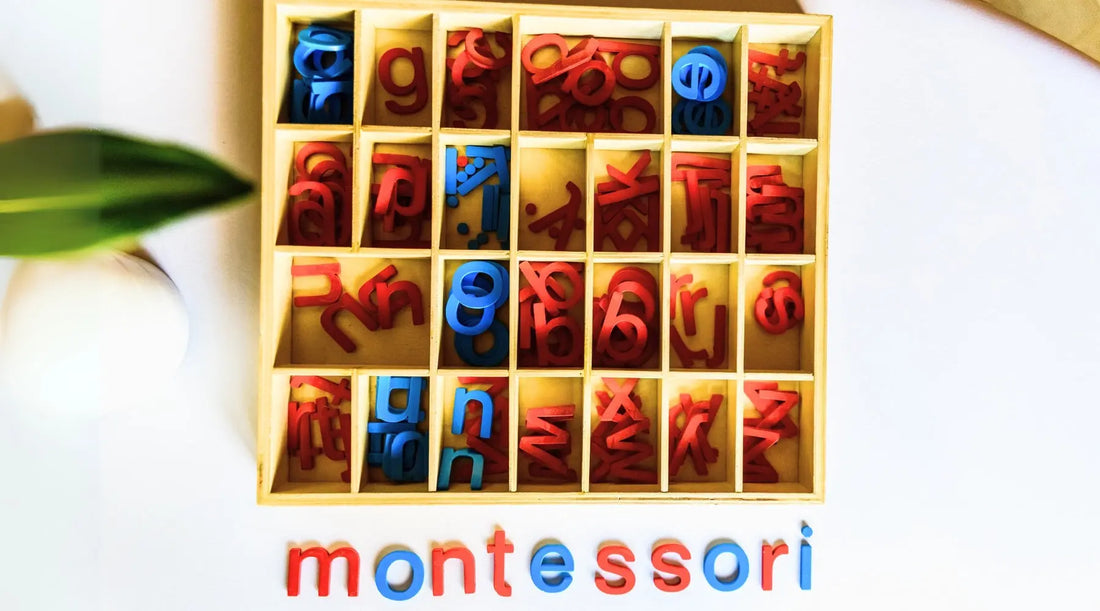
The key stages of child development according to Montessori pedagogy
Understanding Child Development According to Montessori
Montessori pedagogy is based on the idea that each child follows a natural and progressive development, punctuated by sensitive periods during which they are particularly receptive to certain learning. Unlike traditional educational approaches, Montessori is not based on chronological age but on the observation of the child and their needs.
Maria Montessori divided child development into four major phases, called planes of development, which span from birth to adulthood. In this article, we'll explore these milestones and see how to adapt your child's environment and activities to each stage.
1. The first development plan (0-6 years): the absorbent mind and building the foundations
From 0 to 3 years: The unconscious absorbent mind
The first years of life are a period of intense learning. Children have an absorbent mind, meaning they learn unconsciously by observing and interacting with their environment. Everything around them influences their sensory, motor, and cognitive development.
Main features:
✔ Sensory and motor development (grasping, exploration, walking)
✔ Language acquisition (imitation, babbling, first words)
✔ Building trust and attachment
How to accompany him?
• Favor an environment rich in sensory stimulation: Montessori mobiles, rattles, play mats .
• Offer objects adapted to their motor skills: nesting games, sensory balls, treasure baskets.
• Introduce a foreign language from a young age through books, nursery rhymes and natural interactions.
Ages 3-6: The Conscious Absorbent Mind
The child begins to structure everything he has unconsciously absorbed. He develops his independence, concentration, and desire to actively learn. It is also during this period that he is very receptive to order and routines.
Main features:
✔ Development of language and cognitive abilities
✔ Appearance of logical thinking and classification of objects
✔ Great interest in autonomy and imitation of adults
How to accompany him?
• Introduce practical everyday activities: pouring water, dressing alone, washing objects.
• Encourage fine motor skills with puzzles, stringing beads, and construction games.
• Promote socialization and cooperation with adapted group activities.
2. The second development plan (6-12 years): The reasoning mind and intellectual curiosity
This period is marked by a shift from sensory learning to more abstract learning. The child becomes an intellectual explorer, eager to understand the world around him.
Main features:
✔ Strong curiosity and desire to understand complex concepts
✔ Development of logical thinking and reasoning
✔ Importance of social interactions and notions of justice
How to accompany him?
• Offer scientific experiments and discoveries: observation of nature, simple experiments at home.
• Introduce advanced Montessori materials: math beads, nomenclature cards, globe.
• Encourage collaborative projects to develop cooperation and problem solving.
At this age, the child develops an understanding of the world and society, so it is important to let him ask questions and seek answers for himself.
3. The third development plan (12-18 years): The adolescent in search of identity
Adolescence is a phase of physical, emotional, and social transformation. Adolescents seek to find their place in the world and develop their autonomy.
Main features:
✔ Seeking independence and questioning the rules
✔ Interest in social relationships and place in society
✔ Development of critical thinking and practical skills
How to accompany him?
• Provide opportunities to learn through experience (internships, outdoor activities, responsibilities).
• Encourage debate and critical thinking to help structure their thinking.
• Encourage project management to develop self-confidence.
The Montessori approach often offers school farms or nature projects to reconnect adolescents with concrete activities and cooperation.
4. The fourth development plan (18-24 years): Towards adulthood
At this stage, the emerging adult seeks to build a place for themselves in the world of work and society. They refine their values and develop complete independence.
Main features:
✔ Making important decisions for the future
✔ Development of professional and personal skills
✔ Social commitment and desire to contribute to the world
How to accompany him?
• Encourage initiative and entrepreneurship.
• Provide a framework for independent learning and experimentation.
• Help develop responsible and committed thinking in society.
Montessori does not stop at childhood: it is a philosophy of life that guides the individual towards complete autonomy and harmonious development.
A natural and respected development
Montessori pedagogy allows us to support the child according to their own needs and their own pace, respecting sensitive periods and providing them with an environment conducive to their development.
Each developmental stage is an essential step toward autonomy and self-development. By understanding these phases, parents can better guide their child toward a fulfilling, free, and structured learning experience.
At Noor & Koala, we have specially designed educational boxes inspired by the Montessori method to offer your children the best in development, from birth.
If you want to apply these principles at home, don't hesitate to incorporate games, activities and an environment adapted to each stage of development.
